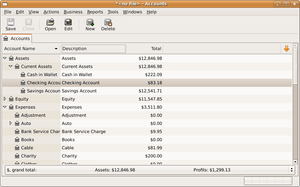GnuCash
|
| |
 Screenshot of GnuCash | |
| Original author(s) | Gnumatic[1] |
|---|---|
| Developer(s) | GnuCash development team |
| Initial release | 1998[2] |
| Stable release | 2.6.1 (January 27, 2014) [±] |
| Preview release | 2.5.10 (December 15, 2013) [±] |
| Written in |
C, Scheme[3] Java (Android App)[4] |
| Platform | Cross-platform[5] |
| Available in | Multilingual[6] |
| Type | Accounting and personal finance |
| License |
GNU General Public License Apache License 2 (Android App)[7] |
| Website | www.gnucash.org |
GnuCash is a free software accounting program that implements a double-entry bookkeeping system. It was initially aimed at developing capabilities similar to Intuit, Inc.'s Quicken application,[8] but also has features for small business accounting.[9] Recent development has been focused on adapting to modern desktop support-library requirements.
GnuCash is part of the GNU Project,[10][11] and runs on Linux, OpenBSD, FreeBSD, Solaris, Mac OS X, and other Unix-like platforms.[5] A Microsoft Windows (2000 or newer) port was made available starting with the 2.2.0 series.[12]
History
Programming on GnuCash began in 1997, and its first stable release was in 1998. Small Business Accounting was added in 2001. A Mac installer became available in 2004. A Windows port was released in 2007.[2]
In May 2012, the development of GnuCash for Android was announced.[13] This is an expense-tracking companion app for GnuCash, as opposed to a stand-alone accounting package.
Features
- Double-entry bookkeeping[6]
- Scheduled Transactions[6]
- Mortgage and Loan Repayment Assistant
- Small Business Accounting Features[9]
- OFX, QIF Import[6]
- HBCI Support[6]
- Transaction-Import Matching Support
- SQL Support
- Multi-Currency Transaction Handling[6]
- Stock/Mutual Fund Portfolios
- Online Stock and Mutual Fund Quotes
- Built-in and custom reports and charts
- Budget
- Bank and Credit Card reconciliation
- Check printing
Small business accounting features
- Invoicing
- Accounts Receivable (A/R)
- Accounts Payable (A/P) including bills due reminders
- Employee expense voucher
- Depreciation
- Mapping to income tax schedules and TXF export for import into tax prep software (US)
- Setting up tax tables and applying sales tax on invoices
Technical design
GnuCash is written primarily in C, with a small fraction in Scheme.[3] One of the available features is pure fixed-point arithmetic to avoid rounding errors which would arise with floating-point arithmetic. This feature was introduced with version 1.6.[14]
The Android App for GnuCash is written in Java[4] and does not share any code with the PC software.[7]
Users
Users on the GnuCash mailing list have reported using it for United States 501(c)3 non-profit organizations successfully. However, the reports need to be exported and edited.[15]
Slaw, a Canadian legal webzine, offered this advice to lawyers just starting out in practice, especially those who are trying to pay off student loans, "The GnuCash software...should present a great alternative for lawyers looking for a solid accounting system at low cost. Do not believe that open source software is somehow second-class."[16]
In April 2011, the Minnesota State Bar Association made freely available their GnuCash trust accounting guide in PDF format.[17]
Download stats
As of June 2012, Sourceforge shows a count of over 2.7 million downloads of the stable releases starting from July 2007 with GnuCash 2.2.[18] Also, Sourceforge shows that current downloads are running at 13,775 per week.[19] However, this doesn’t include other software download sites as well as Linux distributions that provide download from their own repositories.
Project status
Ohloh did an analysis of the source code repository and compared the commit activity for the two years before March 2012 and concluded that the project has a mature, well established code base, with increasing year-over-year development activity and a large active development team.[20]
See also
References
- ↑ http://primates.ximian.com/~miguel/gnome-history.html
- ↑ 2.0 2.1 "Free Accounting Software - GnuCash". gnucash.org. Retrieved 2011-03-13.
- ↑ 3.0 3.1 "Why don't you rewrite GnuCash in programming language xyz so that I can contribute easily?". Frequently asked questions. GnuCash website. Retrieved 2010-05-14. "GnuCash is a large body of code maintained by a small group of developers who are comfortable in C and Scheme (Guile). Actually, 80% of it is in C and approx. 13% is in Scheme/Lisp."
- ↑ 4.0 4.1 http://www.codinguser.com/2012/07/coding-money-in-gnucash-for-android/
- ↑ 5.0 5.1 "Download GnuCash". GnuCash. GnuCash. Retrieved 2010-05-14.
- ↑ 6.0 6.1 6.2 6.3 6.4 6.5 Canterford, Conrad (2006-11-06). "Review: GnuCash 2.0". Linux.com. Retrieved 2008-04-14.
- ↑ 7.0 7.1 http://www.codinguser.com/2012/08/gnucash-for-android-now-with-apache-license-version-2-0/
- ↑ "X-Accountant". gnucash.org. Retrieved 2011-03-13.
- ↑ 9.0 9.1 "1.1. What is GnuCash?". GnuCash Documentation. GnuCash. Retrieved 2010-05-14.
- ↑ "Index of /gnu". GNU Project FTP Server. GNU Project. Retrieved 2010-05-14.
- ↑ "GNU Readme". GNU Project FTP Server. GNU Project. Retrieved 2010-05-14. "Programs that are directly in this directory are actually GNU programs, developed under the auspices of GNU."
- ↑ "FAQ GnuCash". Retrieved 2010-10-11.
- ↑ http://www.codinguser.com/2012/05/gnucash-mobile/
- ↑ "What's new in GnuCash 1.6?". gnucash.org. Retrieved 2010-09-03.
- ↑ "GnuCash for non profits". gnucash.org mail archive. Retrieved 2011-03-11.
- ↑ "There's G'No Cash Like GnuCash". Slaw.ca. Retrieved 2011-03-21.
- ↑ "Keeping Client Trust Accounts with GnuCash". Minnesota State Bar Association. Retrieved 2011-04-20.
- ↑ "Download Gnucash software for free at SourceForge.net". Sourceforge.net. Retrieved 2012-06-17.
- ↑ "SourceForge.net: Software search". Sourceforge.net. Retrieved 2011-02-28.
- ↑ "GnuCash – Ohloh Analysis Summary". ohloh.net. Retrieved 2011-03-12.
Further reading
- Garrels, Machtelt (2002-06-08). "Keep Track of Your Money". Linux Journal. Retrieved 2008-04-14.
- "If You Knew Cash Like GnuCash Knows Cash". linux-mag.com. 2008-09-03. Retrieved 2008-09-03.
- Barr, Joe (2006-11-08). "Using GnuCash 2.0 to balance your checkbook". Linux.com. Retrieved 2008-04-14.
External links
| Wikimedia Commons has media related to GnuCash. |
| ||||||||||||||||||||||||||||||||